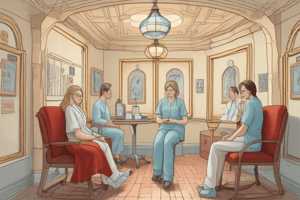Podcast
Questions and Answers
Which of the following theories focuses on the patient's self-care needs?
Which of the following theories focuses on the patient's self-care needs?
- Peplau's Interpersonal Theory
- Leininger's Culture Care Theory
- Orem's Self-Care Deficit Nursing Theory (correct)
- Nightingale's Environmental Theory
Which of the following is NOT a phase of Peplau's Interpersonal Theory?
Which of the following is NOT a phase of Peplau's Interpersonal Theory?
- Evaluation (correct)
- Preorientation
- Orientation
- Resolution
What is the primary focus of Nightingale's Environmental Theory?
What is the primary focus of Nightingale's Environmental Theory?
- Interpersonal relations between nurse and patient
- Patient's self-care needs
- Environment as the focus of nursing care (correct)
- Cultural care diversity and universality
Which of the following is a middle-range theory?
Which of the following is a middle-range theory?
What is the main purpose of the National Council of State Boards of Nursing Clinical Judgment Model?
What is the main purpose of the National Council of State Boards of Nursing Clinical Judgment Model?
Which of the following is a characteristic of nursing knowledge?
Which of the following is a characteristic of nursing knowledge?
What is the primary goal of nursing knowledge?
What is the primary goal of nursing knowledge?
Which type of theory is narrow in scope and focuses on specific nursing practices?
Which type of theory is narrow in scope and focuses on specific nursing practices?
What is the primary goal of using the National Council of State Boards of Nursing Clinical Judgment Model?
What is the primary goal of using the National Council of State Boards of Nursing Clinical Judgment Model?
What is the primary purpose of prescriptive theories in nursing?
What is the primary purpose of prescriptive theories in nursing?
Which of the following is a characteristic of middle-range theories?
Which of the following is a characteristic of middle-range theories?
What is the relationship between theory and evidence-based practice (EBP)?
What is the relationship between theory and evidence-based practice (EBP)?
What is the primary focus of descriptive theories in nursing?
What is the primary focus of descriptive theories in nursing?
What is the primary role of theory in nursing practice?
What is the primary role of theory in nursing practice?
What is the term for the examination of the relationships of various components that make up the knowledge of a discipline?
What is the term for the examination of the relationships of various components that make up the knowledge of a discipline?
What is the characteristic of shared theories in nursing?
What is the characteristic of shared theories in nursing?
What is the term for the aspect of nursing that is conceptualized to describe, explain, predict, or prescribe nursing care?
What is the term for the aspect of nursing that is conceptualized to describe, explain, predict, or prescribe nursing care?
What is the component of a theory that refers to the specific phenomenon being studied?
What is the component of a theory that refers to the specific phenomenon being studied?
What is the era of nursing theory development that is characterized by the development of nursing curriculum frameworks?
What is the era of nursing theory development that is characterized by the development of nursing curriculum frameworks?
What is the term for the overall framework that includes the concepts of person, health, and environment/situation?
What is the term for the overall framework that includes the concepts of person, health, and environment/situation?
What is the current era of nursing theory development, which is characterized by the use of theories to guide practice?
What is the current era of nursing theory development, which is characterized by the use of theories to guide practice?
What is the primary goal of theoretical knowledge in nursing science?
What is the primary goal of theoretical knowledge in nursing science?
What type of knowledge is based on nurses' experiences in providing care to patients?
What type of knowledge is based on nurses' experiences in providing care to patients?
What is the purpose of considering findings from theory-based research in nursing practice?
What is the purpose of considering findings from theory-based research in nursing practice?
What is the primary focus of theory-generating research in nursing?
What is the primary focus of theory-generating research in nursing?
What is the purpose of theory-testing research in nursing?
What is the purpose of theory-testing research in nursing?
What is the outcome of both theory-generating and theory-testing research in nursing?
What is the outcome of both theory-generating and theory-testing research in nursing?
How do nurses incorporate research-based interventions into their practice?
How do nurses incorporate research-based interventions into their practice?
What is the relationship between theory and research in nursing?
What is the relationship between theory and research in nursing?
What is the ultimate goal of the links between theory, knowledge development, and research in nursing?
What is the ultimate goal of the links between theory, knowledge development, and research in nursing?
Flashcards are hidden until you start studying
Study Notes
Theoretical Foundations of Nursing Practice
- Theory serves as the foundation for nursing care, and it is bound together with research and practice in a continuous interactive relationship.
- Theory helps explain an event by defining ideas or concepts, explaining relationships among the concepts, and predicting outcomes.
Components of a Theory
- Phenomenon
- Concepts
- Definitions
- Theoretical/conceptual
- Operational
- Assumptions
Domain of Nursing
- Domain
- Paradigm
- Conceptual framework
- Nursing metaparadigm
- Person
- Health
- Environment/Situation
Evolution of Nursing Theory
- First nursing theorist: Florence Nightingale
- Stages of evolution:
- Curriculum era: 1900s-1940s
- Research era: 1950s-1970s
- Graduate education era: 1950s-1970s
- Theory era: 1980s-1990s
- Theory utilization era: 2000s-today
Types of Theory
- Grand: Abstract, broad in scope, complex
- Middle-range: Limited in scope and less abstract
- Practice: Narrow in scope and focus
- Descriptive: Describe phenomena and identify circumstances in which phenomena occur
- Prescriptive: Address nursing interventions for a phenomenon, guide practice change, and predict the consequences
Theory-Based Nursing Practice
- Nursing knowledge is derived from basic and nursing sciences, experience, aesthetics, nurses' attitudes, and standards of practice
- Goal of nursing knowledge: To explain the practice of nursing as different and distinct from the practice of medicine, psychology, and other health care disciplines
- Theory generates nursing knowledge for use in practice, thus supporting EBP
Shared Theories
- Explain a phenomenon specific to the discipline that developed the theory
- Several nursing theories are based on systems theory, which includes the nursing process as a system
- Nursing process components:
- Input
- Output
- Feedback
- Content
Select Nursing Theories
- Nightingale's Environmental Theory
- Focus on environment as the focus of nursing care
- Grand theory
- Peplau's Interpersonal Theory
- Focus on interpersonal relations between nurse, patient, and patient's family
- Phases: preorientation, orientation, working, resolution
- Middle-range theory
- Orem's Self-Care Deficit Nursing Theory
- Focus on patient's self-care needs
- Continually assess how much self-care a patient is able to perform
- Grand theory
- Leininger's Culture Care Theory
- Theory of cultural care diversity and universality
- Integrates patients' cultural traditions, values, and beliefs into care plans
- Middle-range theory
- National Council of State Boards of Nursing Clinical Judgment Model
- Developed to help guide nursing educators in evaluating nursing students' abilities to make clinical judgments
- Model with multiple layers that help explain the cognitive process nurses use to make clinical judgments
- Students can use this model to learn how to think like a nurse and make safe clinical decisions
Links Among Theory and Knowledge Development and Research in Nursing
- Nursing knowledge is theoretical and experiential
- Theoretical knowledge: goals are to stimulate thinking and create a broad understanding of nursing science and practice
- Experiential knowledge: based on nurses' experiences in providing care to patients
- Nurses consider findings from theory-based research to determine whether the theory can be used in practice
- Research is used to develop new theories and refine the knowledge base of nursing
- Theory-generating research: uses logic to explore relationships among phenomena
- Theory-testing research: determines how accurately a theory describes a nursing phenomenon
Studying That Suits You
Use AI to generate personalized quizzes and flashcards to suit your learning preferences.




